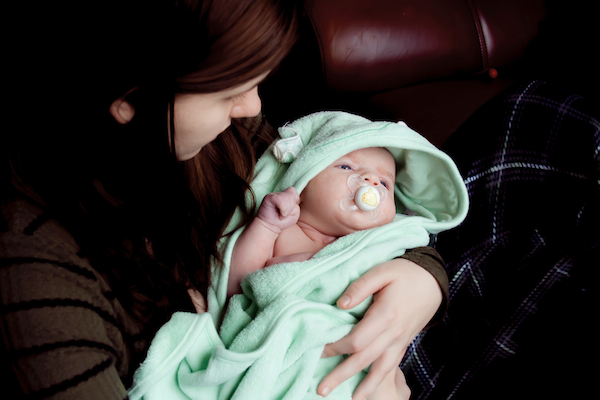
The clock snaked past midnight. I lay in bed, slicked in sweat.
I closed my eyes, tried to make my brain go blank, but my body felt wired, as if my heart had slipped into a different rhythm—quick, frantic, unsteady.
My baby was finally sleeping in a bassinet next to me, making soft, snorting sounds. My body was exhausted. But I couldn’t quiet my mind enough to sleep. Desperate thoughts darted through my head: I can’t do this. I’ve made a terrible mistake. He deserves better than me.
I’d been through depression before. I knew what it felt like to trod through the quicksand of hopelessness. I knew that with my history of depression and anxiety, I was at an elevated risk for postpartum depression.
But I could never have imagined the terrible textures of it. How different postpartum depression was from the other depressions I’d experienced. How the pressure of new motherhood would hijack my mind, how all the myths I’d unconsciously swallowed about what it meant to be a mother would rise up to taunt me, hissing I was already failing my son.
I couldn’t have known how splintered our minds can become when we don’t sleep, and how that distortion feeds the depression, braiding it into something thicker and more treacherous.
And I couldn’t have conjured up the deep, welling shame of postpartum depression.
I gazed at my baby, into his new and ancient slate-blue eyes, and I felt tenderness, and soft sweeps of love. But I also wanted out. Out of the sacred role of mother, the relentlessness of it, the impossibility of trying to learn how to keep a small baby alive while my brain battled against itself, while my body still bled and ached from birth, while Facebook articles trumpeted all the ways I could be mothering better.
Buddhism describes a concept called “the second arrow.”
The first arrow is the challenging thing that is happening to us—in this instance, it was having postpartum depression. The second arrow, which causes additional pain, is our reaction or judgement about the first arrow: I hated myself for having a broken brain, for not deserving my beautiful son, this new soul the universe had wrongly entrusted me with.
It’s been eight years. That little baby has morphed into an eight-year-old who loves football, comic books, and his mama. We are woven tightly, a deep tangle of love between us. But I can still feel the edges of that era when I close my eyes—the coursing panic, the bottomless overwhelm, the darkness that seeded in my chest, twisting through my mind.
I wish I could go back to that younger me, and whisper what I know now:
Sweet girl. It won’t always feel this way. The twisting thoughts that pulse through you have nothing to do with your love for your child, with the relationship you will grow through time. You are bonding and weaving together a gritty, glittering love, even now. This is an illness, a hormone-washed infection of the brain, not a reflection of your character, your ability to mother, or the connection you will have with your child.
This will ease. This will end.
When I stare at you now, through the soft lens of time, I don’t see someone who is weak or bad or broken. I see a new mother, fighting one of the most brutal battles of her life, and suffering with that second aching arrow. I see you feeding your son with your body, cradling him with your arms, even as your bruised body heals and remakes itself. I see someone who doesn’t think she can do this mothering thing, someone who doesn’t realize she is already doing it.
I see a warrior.
~
Author: Lynn Shattuck
Image: Sean Roy/Unsplash; “Susanna,” 2013
Editor: Catherine Monkman











Read 0 comments and reply